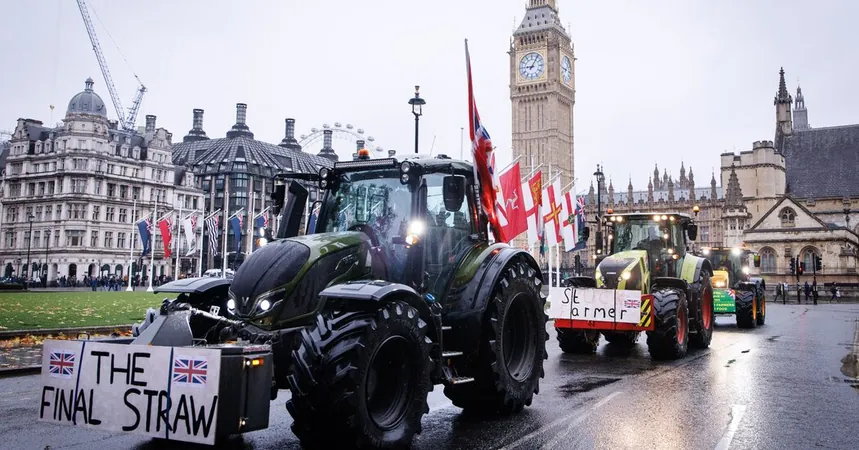
Farmers Unite in London Against New Inheritance Tax Regulations: "No Farmers, No Food!"
2024-11-19
Author: Lok
Farmers Protest in Central London
In a powerful display of discontent, thousands of farmers descended upon central London on Tuesday, marking one of the largest protests against a government policy since the Labour government took office in July. Spirited farmers, brandishing banners proclaiming “No farmers, no food,” coordinated a dramatic march of tractors that paraded past the iconic Houses of Parliament.
Changes to Inheritance Tax Increase Tensions
The catalyst for this nationwide outcry stemmed from changes to inheritance tax outlined in last month’s budget by Chancellor of the Exchequer, Rachel Reeves. Previously, agricultural assets valued over a million pounds were exempt from inheritance tax; under the new regulations, these assets will now incur a 20% tax starting in April 2026. Even though this rate is half of the standard inheritance tax, many farmers fear this shift will force families to sell their ancestral farms instead of passing them down to future generations. While government estimates suggest that 73% of farms will not be directly impacted due to various allowances, farmers argue that this change represents a significant blow to family farming traditions.
Growing Discontent in Rural Communities
Tuesday’s protest coincided with a growing sentiment among rural communities, who have felt disregarded by successive governments, particularly in the wake of Brexit. Farmers argue that the end of EU membership has left them worse off as they witness the erosion of the subsidy system that once provided substantial financial support. Now, many struggle with rising export costs and prices squeezed by major supermarket chains.
Historical Context of Farmers' Protests
A similar demonstration occurred last week in Wales, where protesters rallied outside a high-profile conference attended by Prime Minister Keir Starmer. Though British farmers are often seen as less militant compared to their European counterparts, the sheer number of demonstrators on Tuesday harkened back to the massive protests of 2002, when farmers objected to attempted bans on traditional practices like fox hunting.
Voices of Protest and Concern About the Future
Echoing the discontent of the agricultural community, television personality and farmer Jeremy Clarkson controversially suggested that these policies could lead to a deliberate "ethnic cleansing" of the countryside. While his comments garnered attention, they also underscored the broader anxiety amongst farmers about government intentions regarding rural land.
Critics Assess the Impact of Tax Changes
Critics highlight that the policy change could indirectly exacerbate the challenges faced by farming families, leading to increased land sales and potentially rising land prices as wealthier individuals seek to invest. However, experts maintain that farmers still enjoy preferential treatment concerning inheritance compared to the general population, estimating that fewer than 500 farms will be affected each year.
Government's Position on the Protests
Ms. Reeves and Agricultural Secretary Steve Reed acknowledged the frustration among farmers, dubbing them "the backbone of Britain." They justified the tax changes, emphasizing the financial strains on public services and making the case that wealthier estates should contribute fairly to public welfare.
Personal Stories from the Protest
Amid the sea of protestors in Whitehall was Jasper Bacon, a dairy farmer from Wiltshire. With 220 cows to care for, Bacon expressed his frustrations about the mounting pressures facing farmers today. “The money we get from our milk is not enough to cover production costs,” he lamented, emphasizing that the inheritance tax issue was “the final straw.”
Determined Farmers Stand Strong
As rain continued to pour, the farmers showed unwavering resolve. “We are used to it,” Bacon remarked, embodying the spirit of a community determined to fight for their future amidst the growing challenges of modern farming life. The question remains whether the government will heed their voices or if this protest is just the beginning of a larger movement for agricultural reform in the U.K.



 Brasil (PT)
Brasil (PT)
 Canada (EN)
Canada (EN)
 Chile (ES)
Chile (ES)
 España (ES)
España (ES)
 France (FR)
France (FR)
 Hong Kong (EN)
Hong Kong (EN)
 Italia (IT)
Italia (IT)
 日本 (JA)
日本 (JA)
 Magyarország (HU)
Magyarország (HU)
 Norge (NO)
Norge (NO)
 Polska (PL)
Polska (PL)
 Schweiz (DE)
Schweiz (DE)
 Singapore (EN)
Singapore (EN)
 Sverige (SV)
Sverige (SV)
 Suomi (FI)
Suomi (FI)
 Türkiye (TR)
Türkiye (TR)